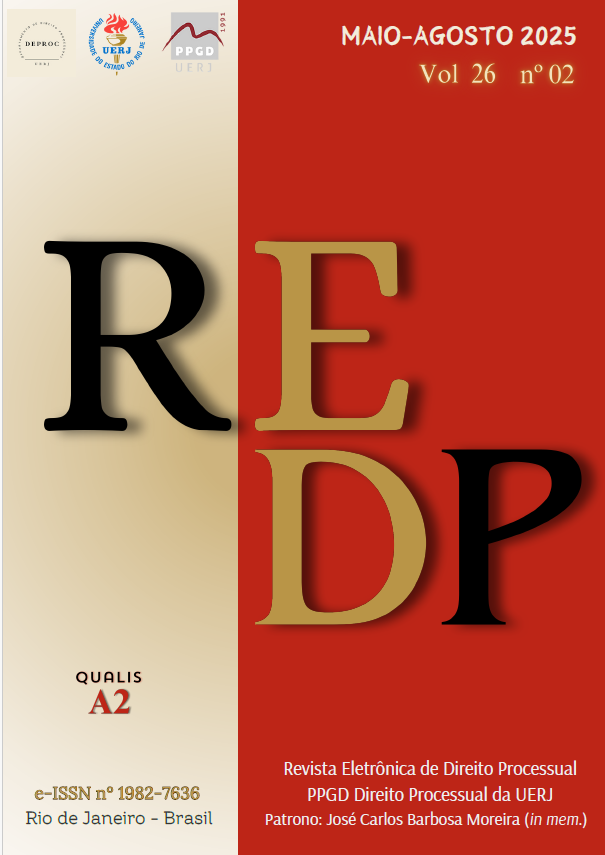O CABIMENTO DO IRDR NOS TRIBUNAIS SUPERIORES
REFLEXÕES A PARTIR DO CASO JULGADO PELO SUPERIOR TRIBUNAL MILITAR
DOI:
https://doi.org/10.12957/redp.2025.82265Resumo
Desde o início da vigência do Código de Processo Civil de 2015 criou-se uma expectativa sobre o posicionamento dos tribunais superiores acerca do cabimento do Incidente de Resolução de Demandas Repetitivas diretamente naquelas cortes. Conquanto não se tenha definido claramente por lei sobre tal (im)possibilidade e a doutrina divirja nesse tema, alguns tribunais passaram a se debruçar sobre o assunto, até que o Superior Tribunal Militar veio a julgar no mérito o seu primeiro IRDR (e o primeiro a ser admitido em um tribunal superior). Assim, o objetivo principal deste estudo foi a análise do cabimento do IRDR nos tribunais de vértice à luz do caso julgado pelo STM, considerando como a corte castrense examinou os requisitos de admissibilidade do incidente, segundo as características específicas daquele tribunal e seu respectivo ramo do direito, bem como o procedimento adotado para o deslinde do julgamento até a fixação da tese, considerando as diretrizes do próprio CPC. Além de um aprofundamento na discussão sobre o cabimento do IRDR nas cortes superiores, o estudo forneceu interessantes constatações sobre a realidade da litigância na justiça militar e do próprio STM, que ao mesmo tempo é uma corte de revisão e um tribunal de vértice para a Justiça Militar. A forma como os requisitos do artigo 976 do CPC foram analisados no caso estudado também demonstram que a concepção sobre as demandas repetitivas pode assumir contextos diferentes de acordo com o ramo de justiça, como é o caso da Justiça Militar. Foi possível verificar a utilização do IRDR com finalidade de gerenciamento de demandas em sede de um tribunal superior, o qual não tem ao seu dispor a ferramenta dos recursos repetitivos. De qualquer modo, o estudo também nos leva a reflexões mais profundas sobre os princípios e fundamentos do IRDR e a sua real aplicabilidade para matérias estritamente de competência de cortes superiores, que muitas vezes não tangenciam as demandas repetitivas.
Downloads
Publicado
Como Citar
Edição
Seção
Licença
Copyright (c) 2025 Victor Dantas de Maio Martinez, Camilo Zufelato, Fernando Antônio Oliveira

Este trabalho está licenciado sob uma licença Creative Commons Attribution 4.0 International License.
Todos os artigos publicados na Revista Eletrônica de Direito Processual (REDP) (Departamento de Direito Processual, Universidade do Estado do Rio de Janeiro, Brasil) são licenciados por meio de uma Licença Creative Commons - Atribuição 4.0 Internacional (CC BY 4.0).
Os autores retêm os direitos autorais de seu artigo e concordam em licenciar seu trabalho com a licença CC BY 4.0, aceitando assim os termos e condições específicos desta licença disponíveis no seguinte website: https://creativecommons.org/licenses/by/4.0/legalcode.
- Os autores concedem à REDP o direito de primeira publicação, de se identificar como publicadora original do trabalho e concedem à revista uma licença de direitos não exclusivos para utilizar o trabalho das seguintes formas: Reproduzir, vender e distribuir cópias eletrônicas ou impressas do manuscrito como um todo, de partes específicas do manuscrito e de suas traduções para qualquer idioma;
- O uso do artigo por terceiros é livre, contanto que a integridade da publicação seja mantida e seus autores originais, periódico de primeira publicação e detalhes de citação sejam identificados.
Dentro dos termos da licença, os autores podem entrar em acordos contratuais adicionais separados para a distribuição não exclusiva da versão publicada do trabalho na revista.
Copyright and Licensing
All articles published in the Procedural Law Electronic Review (REDP) (Department of Procedural Law, State University of Rio de Janeiro, Brazil) are licensed under a Creative Commons License - Attribution 4.0 International (CC BY 4.0).
- Authors retain copyright to their article and agree to license their work under the CC BY 4.0 license, thereby accepting the specific terms and conditions of this license available at the following website: https://creativecommons.org/licenses/by/4.0/ legal code.
- Authors grant REDP the right of first publication, to identify itself as the original publisher of the work, and grant the journal a non-exclusive license to use the work in the following ways: Reproduce, sell and distribute electronic or printed copies of the manuscript as a whole, of specific parts of the manuscript and its translations into any language;
- Use of the article by third parties is free, as long as the integrity of the publication is maintained and its original authors, first publication journal, and citation details are identified.
Within the terms of the license, authors may enter into separate additional contractual agreements for the non-exclusive distribution of the published version of the work in the journal.




